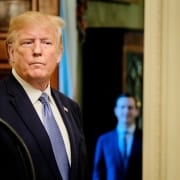On August 3rd, 2020, President Trump issued an executive order entitled “Executive Order Aligning Federal Contracting and Hiring Practices with the Interests of American Workers.†This order follows a trend of curtailing employment-based immigration, as Trump cites the economic crisis catalyzed by the coronavirus pandemic as a primary justification for newly adopted immigration policies. The new executive order bars federal agencies from replacing U.S. citizens and green card holders with foreign workers, accompanied by new increased scrutiny of federal contractors who use temporary nonimmigrant visas to hire foreign labor for high-skilled jobs.
The order does not require any immediate actions from federal contractors, it foreshadows a potential future order that bolsters entry restrictions and increases Department of Labor and Department of Homeland and Security audits. Furthermore, while the August 3rd order does not introduce new restrictions on H-1B visas, such a change to federal employer policy will make H-1B visas more difficult to obtain.
On August 3rd, during a meeting with U.S. Tech companies, President Trump condemned the alleged abuses of U.S. workers by the Tennessee Valley Authority, whose CEO Jeffrey Lyash recently announced that the company would replace over 200 American workers with cheaper foreign workers hired from overseas. Trump denounced that Lyash, “sadly and cruelly betrayed American workers.†Trump criticized such employers who trade American jobs for temporary foreign labor, as this supposedly reduces opportunities for American workers.
Broadly, the execuive order instructs all federal agencies to review existing contracting and subcontracting practices and to determine if these practices have adverse impacts on American workers, whether due to offshored positions or the temporary use of foreign labor. The executive order requires that federal agencies propose corrective changes to protect American workers, citing the American economy and national security as main priorities. Within 120 days of the date of the order, August 3rd, 2020, the head of each agency must also submit a report to the Director of the Office of Management and Budget to highlight their findings concerning whether their specific circumstances negatively impact U.S. workers.
Finally, the order directs the Secretaries of Labor and Homeland Security to take action within 45 days of the order to protect American workers from potential adverse effects on American wages and workers caused by the use of H-1B visa holders at job sites (and third-party job sites), including measures to ensure that all employers of H-1B visa holders (as well as secondary employers) comply with the requirements of section 212(n) (1) of the Immigration and Nationality Act.
The deep impact of this order on foreign workers is that federal agencies like USCIS and the Labor Department are now given broad discretion to assess immigration applications. This will even further delay an immigration system already in the midst of a slowdown. If a federal agency like USCIS finds reason to believe that an applicant’s immigration case will adversely impact American workers, the applicant’s case will likely be audited or adjudicated, which further slows the painful process of obtaining a visa.
The cost of H-1B visas has already been set to increase by 75% this upcoming October from $460 to $555. Targeted by new policy, foreign employees are increasingly insecure in the United States.
In terms of impacts on immigration, the effects are drastic. It is possible that this new executive order will justify the shortening of visa durations. The entire certification process of recruitment, application, and approval certification will become more complex. While this order will not take effect for over another month, it instills anxiety and looming uncertainty into foreign workers. As they wait for clearer specifics concerning their employment, foreign workers on temporary work visas are placed in a limbo.





